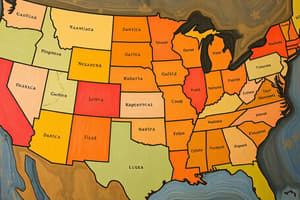Podcast
Questions and Answers
What significant ecological feature does the Mississippi River support?
What significant ecological feature does the Mississippi River support?
- Urban environments and industrial areas
- Mountain ranges and rocky cliffs
- Deserts and sandy beaches
- Diverse ecosystems, including wetlands (correct)
Which of the following rivers is NOT a major tributary of the Mississippi River?
Which of the following rivers is NOT a major tributary of the Mississippi River?
- Columbia River (correct)
- Arkansas River
- Ohio River
- Missouri River
What role did the Mississippi River play in American literature and music?
What role did the Mississippi River play in American literature and music?
- Prominent in Roman poetry
- Only significant in classical music
- Setting for European novels only
- Influence on blues and jazz music (correct)
What is one major environmental concern affecting the Mississippi River?
What is one major environmental concern affecting the Mississippi River?
What has been a historical significance of the Mississippi River during the American Civil War?
What has been a historical significance of the Mississippi River during the American Civil War?
Flashcards are hidden until you start studying
Study Notes
Overview
- The Mississippi River is one of the longest rivers in North America, stretching approximately 2,340 miles.
- It flows from northern Minnesota to the Gulf of Mexico.
Geography
- Major tributaries include the Missouri River, Ohio River, and Arkansas River.
- The river forms part of the borders of several states, including Minnesota, Wisconsin, Iowa, Illinois, Missouri, Kentucky, Tennessee, Arkansas, Mississippi, Louisiana.
Navigation and Economy
- Historically vital for trade and transportation, it serves as a major shipping route.
- The river's watershed drains approximately 1.2 million square miles, impacting agriculture, fishing, and tourism.
Ecological Importance
- Supports diverse ecosystems, including wetlands and wildlife habitats.
- Home to numerous species of fish, birds, and other wildlife.
Historical Significance
- Indigenous peoples have inhabited the region for thousands of years.
- Key role in the development of early American settlements and trade routes.
- Site of significant events during the American Civil War.
Flooding and Management
- Prone to flooding, especially during spring melt-off and heavy rains.
- The U.S. Army Corps of Engineers manages levees and flood control systems to mitigate flood risks.
Cultural Impact
- Influenced literature, music (e.g., blues, jazz), and art.
- Key setting in works by Mark Twain, contributing to American cultural identity.
Environmental Concerns
- Pollution from agricultural runoff and urban development threatens water quality.
- Habitat loss due to damming and river management practices.
Current Issues
- Climate change affects water levels and ecology.
- Ongoing debates over water rights, conservation, and economic use.
Overview
- The Mississippi River spans approximately 2,340 miles from northern Minnesota to the Gulf of Mexico, making it one of North America's longest rivers.
Geography
- Major tributaries include the Missouri, Ohio, and Arkansas Rivers, contributing to its flow.
- The river delineates borders between several states: Minnesota, Wisconsin, Iowa, Illinois, Missouri, Kentucky, Tennessee, Arkansas, Mississippi, and Louisiana.
Navigation and Economy
- Historically essential for trade and transport, the river continues to be a significant shipping route today.
- The watershed drains around 1.2 million square miles, directly influencing agriculture, fishing, and tourism in the region.
Ecological Importance
- The Mississippi River supports a variety of ecosystems, notably abundant wetlands and diverse wildlife habitats.
- It is home to numerous species of fish, birds, and other wildlife, making it crucial to biodiversity.
Historical Significance
- Indigenous peoples have lived in the Mississippi River region for thousands of years, utilizing its resources.
- The river was vital for early American settlements and trade, shaping economic development.
- It was a significant site during the American Civil War, influencing military and economic strategies.
Flooding and Management
- The river is susceptible to flooding, particularly during spring melt-off and after heavy rainfall.
- Flood risks are mitigated by the U.S. Army Corps of Engineers, which manages levees and flood control systems.
Cultural Impact
- The Mississippi River has profoundly influenced American literature, music (notably blues and jazz), and visual arts.
- Mark Twain's works prominently feature the river, highlighting its role in shaping American cultural identity.
Environmental Concerns
- Pollution from agricultural runoff and urban development poses significant threats to water quality.
- Habitat loss emerges from damming and river management practices affecting wildlife and ecosystems.
Current Issues
- Climate change is impacting water levels and the ecological balance of the river.
- Ongoing discussions focus on water rights, conservation efforts, and the economic utilization of river resources.
Studying That Suits You
Use AI to generate personalized quizzes and flashcards to suit your learning preferences.




